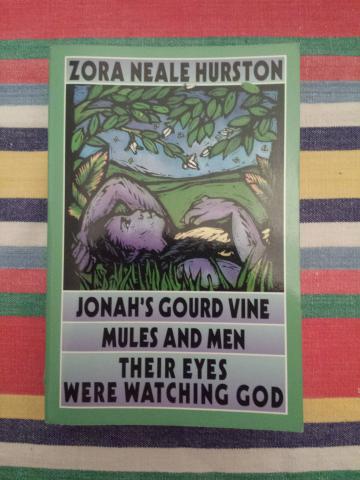Book Review: Zora Neale Hurston's "Jonah's Gourd Vine", "Mules and Men", and "Their Eyes Were Watching God"
Aug 11,2015
Although many Americans might remember having to read Their Eyes Were Watching God in high school, a good number of them would probably be shocked to learn that the book, along with the author, Zora Neale Hurston's other offerings, once seemed to be consigned to the grim fate that had befallen their creator up to and after her untimely death: obscurity. Pilloried during her lifetime by such notable African-American (and yes, often male) contemporaries as Richard Wright and Langston Hughes for being insufficiently revolutionary, Hurston's work was forgotten by both black and white Americans for years until Alice Walker, author of The Color Purple, took it upon herself to reevaluate Hurston's work and present it to new audiences. It was this reassessment of Hurston's oeuvre that led to her being granted (quite rightly, I might add) a seat in the annals of esteemed American literature. Although the texts remain the same as they were when Hurston first wrote and published them, the criticism of Hughes, Wright, and other fellow travelers of the Harlem Renaissance that they were quaint at best and frivolous at worst has long since faded away, as the individualistic perspective and rebellious subtext underlying all of them, "a hidden meaning... de inside meanin' of words" (Henry Louis Gates Jr., 191) as one of the characters she purports to have encountered in Mules and Men says, is now recognized by sophisticated scholars and recreational readers. Indeed, curious readers have a chance to see for themselves this "hidden... inside meanin" (Gates Jr,. 191) in a worthy volume put out by Quality Paperback Books that collects two of Hurston's novels and one of her nonfiction outings, as well as introductions and afterwords by academics like Rita Dove and Henry Louis Gates, Jr. On their own, Jonah's Gourd Vine, Mules and Men, and Their Eyes Were Watching God are all engaging, enjoyable reads, but when read in sequence, they give the reader a vivid look at Hurston's tremendous ability to weave stories that not only tickle and touch, but also tell us about ourselves.
The first selection in this volume, Jonah's Gourd Vine, also has the distinction of being Hurston's first novel. In spite of it's early place in her career as a writer, the novel possesses many of the characteristics and addresses many of the themes that would come to define Hurston's manner of writing. The most obvious of these characteristics is the rendering of black characters dialog in a written approximation of the vernacular spoken by many African-Americans in the South at the time (the time being the 1930's). The first spoken line in Jonah's Gourd Vine is said by the main character's mother, Amy Crittenden, as a storm approaches her family's home: "Ole Massa gwinter scrub floors tuhday," (Hurston, pg. 1). The unfiltered authenticity of Amy's speech contrasts sharply with the whimsically-figurative nature of the novel's first line: "God was grumbling his thunder and playing the zig zag lightning thru his fingers," (Hurston, pg.1). It's a very sharp contrast indeed, albeit one wholly typical of the stylistic gulf between the dialog and narration in Hurston's other work. But this should not be taken to mean it is a bad one, for Hurston consistently demonstrates throughout her books in general and Jonah's Gourd Vine in particular that what some readers might write off as uneducated chatter can convey as much weight and meaning as witty metaphors and refined references. Of course, the title of the book itself is one such reference, with the protagonist, young John Crittenden, filling in for the famed Jonah of biblical lore. After getting into a heated argument with his step-father that ends in violence, John is kicked out of his home and forced to leave the rest of his family behind. Making the most of this sad situation, John resolves to cross "Over de Big Creek," (Hurston, 10) near his home, as he always hoped to go over it someday. Over the creek, he finds gainful employment under the tough-but-fair Alf Pearson (often referred to simply as "Mister Alf") and attends school, where he meets Lucy, who is equally-part the titular gourd vine as she is the love of John's life.
For a while, things seem to be looking up for John and Lucy, as he is making good money and eventually becomes a preacher known for his powerful sermons. Unfortunately, John finds himself beset from without by enemies in the church hierarchy who would like nothing more than for him to lose his position and prestige and beset from within by his incessant temptation for female companionship outside of his marriage, straining but never quite destroying his relationship with Lucy. This uneasy state of affairs lasts until fate intervenes and, like when God sent the worm to take the vine away from Jonah, sends illness to take Lucy away from John, leaving him distraught and vulnerable to his weaknesses and thus his enemies. He subsequently finds himself married to the devious Hattie, who uses hoodoo (or voodoo, as it is more commonly referred to as) to enchant him into marrying her, before finally settling down with a woman who attends one of his sermons, Sally Lovelace, in hope that he will be able to move on from his previous marriage to Lucy at last. But just when things start to look up for the two, John succumbs to his base instincts again and sees a prostitute, berating himself for betraying Sally as he drives home only to be killed when a train hits his car as he crosses a railroad track. All in all, it is a tragic tale of a man trying to make his way in the world even as he fights with his inner demons, of a man who, as Mister Alf says before helping John escape the law, “God Himself was looking off when [he] went and got [himself] born,” (Hurston, pg. 99), and of a man who, as the preacher says as he is being laid to rest, “wuz uh man, and nobody knowed ‘im but God,” (Hurston, pg. 202).
The second entry, Mules and Men, is an account of Hurston's travels through the American South in search of what the people she speaks with call "lies" (Hurston, pg. 13): that is, African-American folktales and stories, usually of a fantastic or comic nature. As a black Southerner herself, Hurston was no stranger to such tales. Indeed, she proudly reveals that, "From the earliest rocking of my cradle, I had known about capers Brer Rabbit is apt to cut and what the Squinch Owl says from the house top," (Hurston, pg. 1). Although many readers might not share the history Hurston had with these stories, they are able to not only enjoy them for themselves, they are also able to view them through the anthropological lens that Hurston utilized when she revisited these "lies" she heard in her youth. Within are countless tales of the mythic slave John (or Jack, as he is named in some stories), who somehow always managed to find a way to outsmart Ole Massa, whether it be tricking him into killing his horse and parading around town yelling "Hawse hide for sale! Hawse hide for sale!" (Hurston, pg. 43) or making him think his prayers asking God to strike him dead will work by asking a friend to light matches in the tree that Massa plans to lynch him on. Then there are stories like the one of the white man and the black man trying to get a big bundle that God left in the middle of the road first and one in which Jesus builds his church upon a large rock he made after gluing together the different stones he asked the 12 disciples to bring him that attempt, in their own humorous way, to account for social differences between racial and ethnic groups. Of course, some are simply humorous, such as the story of the young girl who goes to school and returns home educated to the pride of her father only for his pride to turn into outrage when he discovers that she can spell everything but a clucking sound local to their area, indignantly exclaiming "Ah could spell dat myself and Ah ain't been to school a day in mah life," (Hurston, pg. 41).
Hurston's search for stories like these took her from her native Eatonville, a Florida community whose self-sufficiency and racial homogeneity nurtured her rugged individualism and unapologetic appreciation of black culture, to the French Quarter of New Orleans, said to have been the home and final resting place of hoodoo high priestess Marie Leveau. Whether this is a historical fact or just superstition is left for readers to speculate, but people like Turner (no first name given) fervently believe, relating the life and fate of Leveau to Hurston before taking her under his tutelage and giving her an introduction to hoodoo. This culminates in Hurston undergoing one of the hoodoo practitioners' rituals, lying naked on an altar without food for, according to her estimate, no less than sixty-nine hours before rising, being clothed in garments made in snake skin, and finally witnessing the brutal killing of several chickens. Slightly less unsettling are accounts of a woman who once killed the chicken of a neighbor said to practice hoodoo when it entered her garden only to later fall seriously ill, mysteriously dying in spite of the best efforts of her doctor and Hurston's encounter with one Anatol Pierre, who claimed that with nothing more than black candles, a coffin, a small doll, a black cat and chicken he could kill a man without ever touching him. Readers should rest easy though, for Hurston makes it out safely in the end, concluding her study of black folklore and hoodoo with an allusion to one of the stories she came across: "I'm sitting here like Sis Cat, washing my face and usin' my manners," (Hurston, pg. 246). Through the laughs and the shudders, readers too can rest assured that they will leave Mules and Men with the same sense of satisfaction and gratitude.
The last work included in this volume, Their Eyes Were Watching God, is undoubtedly Hurston's most famous work and features thematic and structural similarities to Jonah's Gourd Vine, although it departs from that novel in one very important way: the protagonist, Janie Crawford, is female, giving readers an opportunity to view some of the themes and situations addressed in Jonah's Gourd Vine through the eyes of a woman. Indeed, from the beginning of the novel, Hurston informs readers of what she believes to be the difference between men and women. While men spend their lives waiting for their hopes and dreams, their "Ships at a distance" (Hurston, pg. 1), to be realized, "women forget all those things they don't want to remember, and remember everything they don't want to forget. The dream is the truth. Then they act and do things accordingly," (Hurston, pg. 1). This is the central difference between Janie and John, the difference between Their Eyes Were Watching God and Jonah's Gourd Vine. While John was destroyed both mentally and physically by his endless striving after unattainable goals, Janie tries to make the most of what life throws her way, adapting when necessary to survive, and fighting when necessary to live. It is this wisdom that an older Janie seeks to impart on Phoeby, a curious young girl whom she relays her story to. An orphan, Janie was raised by her grandmother alongside the white children she served as a nanny too, leading her to conclude that she too was white until she started school, much to the amusement of her classmates and teacher. But it wasn't until Janie was older that her troubles started, for that was when, despite her own reservations, she agrees to marry Logan Killicks, a favorite of her grandmother's, on account that he will provide a good life for her and thus she will eventually come to love him. At first, this seems to be the case, as Killicks constantly sings her praises, compliments her appearance, and takes it upon himself to chop all their firewood by himself, but in spite of all these gratuitous acts of kindness, Janie cannot bring herself to love him. Before long, she notices "her husband had stopped talking in rhymes to her. He had ceased to wonder at her long black hair and finger it. Six months back he had told her, 'If Ah kin haul de wood heah and chop it fuh yuh, look lak you oughta be able tuh tote it inside'," (Hurston, pg. 25). In short, the magic was gone, if it ever was there to begin with, and soon enough, she finds herself swept off her feet by a smart-dressed, smooth-talking stranger named Joe Stark, who promptly elopes with her and takes her to a fictionalized version of the Eatonville of Hurston's youth. A powerful, charismatic personality, Joe becomes mayor of the town and begins ingratiating himself and Janie to the citizenry, something that Janie tries to do herself but, in a sign of things to come, is prevented from doing so by Joe. "Ah never married her for nothin' lak dat. She's uh woman and her place is in de home," (Hurston, pg. 41) he remarks when she is asked to give a speech. Surprised and hurt, Janie nevertheless suppresses her feelings and attempts to accommodate her husband's wishes.
Yet, this is to no avail, for Joe's pushy, domineering ways make not only Janie but also the townspeople he is supposed to represent sour on him. Aware of the increasing tension between him and the townspeople, Joe insults and criticizes Janie with increasing frequency when in the company of others, with Janie silently taking it until at last, she explodes on him in front of the men he is discussing business with, prompting him to beat her savagely after the men leave in a feeble attempt to restore his manhood. But the damage has been done, and shortly afterwards, Joe finds himself facing much bigger problems, namely a problem with his kidneys that in the end proves fatal. As he lies on his deathbed, Janie pleas with him to own up to his shortcomings after confessing hers, but it proves to be no use: he dies yelling at her to get out and to be struck dead by lightning. After the funeral, she finds herself getting over Joe's death relatively quickly, prompting disapproving whispers from the community. Indifferent to these rumors, she later muses to Phoeby, "Let 'em say whut dey wants tuh... To my thinkin' mourning oughn't tuh last no longer'n grief," (Hurston, pg. 89), and as it turns out, she has good reason to move past her grief. One day when she is preparing to close her shop, a tall stranger enters and begins flirting with her. Once again, she finds herself in thrall to a smooth-talking stranger, albeit one who goes by the nickname Tea Cake. After the disasters of Killicks and Joe, it appears that Janie has finally found someone who can protect and provide for her while respecting her wishes and autonomy. Unfortunately, their relationship comes to an end when a devastating storm strikes their community and whilst trying to save a cow from drowning, Tea Cake is bitten by a rabid dog. The storm passes, but his resulting madness does not, and after vainly trying to persuade a belligerent Tea Cake to go to the hospital, Janie has no choice but to shoot him when he turns violent. Although she subsequently has to defend herself in court and put up with additional scorn poured upon her by neighbors who believe she killed Tea Cake in cold blood after she is acquitted, she remains confident that she had no choice but to protect herself. Confident, but sad as well, as we learn at her second funeral for a husband, where she wears nothing more than some weathered overalls, the reason being "She was too busy feeling grief to dress like grief," (Hurston, pg. 180). One can rightly say that grief plays a prominent role in Their Eyes Were Watching God, but by no means is it the dominant one. Equally important are resilience and self-reflection, as Janie sums up when she finishes telling Phoeby her tale: "Ah'm back home again and Ah'm satisfied tuh be heah. Ah done been tuh de horizon and back and now Ah kin set heah in mah house and live by comparisons. Dis house ain't so absent of things lak it used tuh be befo' Tea Cake come along. It's full uh thoughts," (Hurston, pg. 182). Prospective readers would stand well to check out Their Eyes Were Watching God for themselves, as they will likely feel like Phoeby does after hearing Janie's story: "Ah done growed ten feet higher from jus' listenin' tuh yuh, Janie!"
Reading Their Eyes Were Watching God on it's own may indeed leave readers with the impression that like Phoeby they have grown, but reading it in conjunction with Hurston's other work like Jonah's Gourd Vine and Mules and Men will likely leave readers feeling like giants. It gives them a chance to see the copious threads underlying Hurston's work, not least among them the human quest for dignity and identity. It is these intangible (some might even say unreachable) objects that all of her characters strive for, whether they be rooted in reality like John the compromised preacher and Janie the indomitable widow or fantastical creations conjured up by generations of African-Americans long before her time like John the wily slave or Marie the mystical matriarch. This doesn't even take into account the sheer pleasure it is to read Hurston's work: the characters come to life thanks to their stylistically-rendered dialog, and her passionate-yet-thoughtful prose fills in any loose-ends left in her narratives. If you're looking for edifying literature or simply an entertaining story, do yourself a favor and read (in sequence, preferably) Zora Neale Hurston's Jonah's Gourd Vine, Mules and Men, and Their Eyes Were Watching God.






